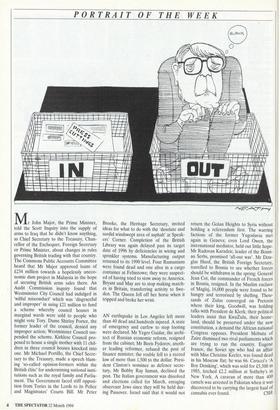PORTRAIT OF THE WEEK
Mr John Major, the Prime Minister, told the Scott Inquiry into the supply of arms to Iraq that he didn't know anything, as Chief Secretary to the Treasury, Chan- cellor of the Exchequer, Foreign Secretary or Prime Minister, about changes in rules governing British trading with that country. The Commons Public Accounts Committee heard that Mr Major approved loans of £234 million towards a hopelessly uneco- nomic dam project in Malaysia in the hope of securing British arms sales there. An Audit Commission inquiry found that Westminster City Council had indulged in `wilful misconduct' which was 'disgraceful and improper' in using £21 million to fund a scheme whereby council houses in marginal wards were sold to people who might vote Tory. Dame Shirley Porter, the former leader of the council, denied any improper action; Westminster Council sus- pended the scheme. Kirklese Council pro- posed to house a single mother with 11 chil- dren in three council houses knocked into one. Mr Michael Portillo, the Chief Secre- tary to the Treasury, made a speech blam- ing 'so-called opinion-formers within the British elite' for undermining national insti- tutions such as the royal family and Parlia- ment. The Government faced stiff opposi- tion from Tories in the Lords to its Police and Magistrates' Courts Bill. Mr Peter
Brooke, the Heritage Secretary, invited ideas for what to do with the 'desolate and sordid windswept area of asphalt' at Speak- ers' Corner. Completion of the British Library was again delayed past its target date of 1996 by deficiencies in wiring and sprinkler systems. Manufacturing output returned to its 1990 level. Four Rumanians were found dead and one alive in a cargo container at Felixstowe; they were suspect- ed of having tried to stow away to America. Bryant and May are to stop making match- es in Britain, transferring activity to Swe- den. The Queen fell off her horse when it tripped and broke her wrist.
AN earthquake in Los Angeles left more than 40 dead and hundreds injured. A state of emergency and curfew to stop looting were declared. Mr Yegor Gaidar, the archi- tect of Russian economic reform, resigned from the cabinet; Mr Boris Fydorov, anoth- er leading reformer, refused the post of finance minister; the rouble fell to a record low of more than 1,500 to the dollar. Presi- dent Clinton's nominee as defence secre- tary, Mr Bobby Ray Inman, declined the post. The Italian government was dissolved and elections called for March, enraging observant Jews since they will be held dur- ing Passover. Israel said that it would not
return the Golan Heights to Syria without holding a referendum first. The warring factions of the former Yugoslavia met again in Geneva; even Lord Owen, the international mediator, held out little hope. Mr Radovan Karadzic, leader of the Bosni- an Serbs, promised `all-out war'. Mr Dou- glas Hurd, the British Foreign Secretary, travelled to Bosnia to see whether forces should be withdrawn in the spring; General Jean Cot, the commander of French forces in Bosnia, resigned. In the Muslim enclave of Maglaj, 16,000 people were found to be hungry and terrorised by shelling. Thou- sands of Zulus converged on Pretoria where their king, Goodwill, was holding talks with President de Klerk; their political leaders insist that KwaZulu, their home- land, should be preserved under the new constitution, a demand the African national Congress opposes. President Mobutu of Zaire dismissed two rival parliaments which are trying to run the country. Eugene Ivanov, the Soviet spy who had an affair with Miss Christine Keeler, was found dead in his Moscow flat; he was 66. Caracci's 'A Boy Drinking', which was sold for £5,500 in 1985, fetched £2.2 million at Sotheby's in New York. A caravan of more than 400 camels was arrested in Pakistan when it was discovered to be carrying the largest haul of


















































 Previous page
Previous page